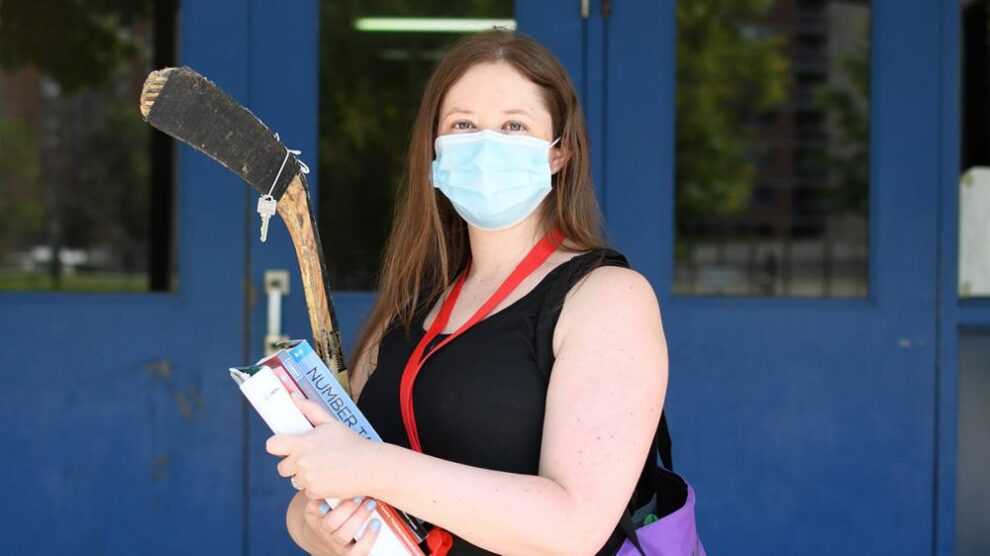I walk the halls looking for the classroom. I could have sworn the office administrator said 148, as she handed me a room key attached to half of a hockey stick (a technique to prevent us from taking home the keys by accident), but now I’ve passed the same door twice and accept that I am officially lost. I look at my watch and realize arriving one hour early was not sufficient, as there were no empty spots in the staff parking lot and I had to find a spot a few streets over on a residential road, lugging my bag of teaching supplies with me. I finally locate room 148 and the day plans on the desk. Ten pages of notes on IEPs and safety plans. A sticky note says the EA who usually pops by around noon is also out sick today. I take a deep breath and put down my hockey stick. I check to see if I remembered to put an ice pack in my lunch bag since I won’t have time to find the staff room fridge, and I begin reading, taking notes and reminding myself “you can do this.” As an occasional teacher, every day is like starting a new job.
I remember one day arriving at a school I had never taught at, in a part of the city I was totally unfamiliar with. When I got to the office I was given a tour, welcomed by the office staff and walked to my classroom. The young students I was teaching were excited to see me, and as I quieted them all on the carpet for the morning announcements. I was shocked when I heard the voice on the PA system say “We would like to welcome Ms. White to our school today, she is in the Grade 2 room. Welcome to our school.” The kids smiled, and I felt like a minor celebrity getting my minute of fame. That one, small gesture completely set me up for a good day. These days are the ones that make being an occasional teacher feel like that coolest job in the world. These moments of connection are our fuel.
Occasional teacher anonymity can bring a sense of detachment from the boards we work for and the communities we teach in. I have longed for opportunities to have a “crew” of people I could talk to about my job who would “get it.” My cat was tired of hearing stories about relearning Pythagorean theorem on the fly when I took middle school assignments, how I unexpectedly had to present an award at a school assembly or how I saw this new innovative literary station set-up. To be honest, she just wasn’t giving me the comradery and feedback I was looking for. I began reaching out to other OTs when I met them in schools and to a friend who had been an OT for many years. They shared my feelings. We were seeking more professional discussions, more opportunities to swap stories and ideas and, most importantly, people we could think of as colleagues – like a travelling staff room. We decided to start the Ottawa Teachers Professional Learning Community, with the idea of making a Facebook group to share new things we had seen or learned, and holding monthly meetings to chat about topics in education. It gave us a chance to talk with other OTs, but also to connect with contract teachers who otherwise wouldn’t have had the time or opportunity to meet us, share with us and get to know us.
COVID Connection
As I write this in August in anticipation of this coming school year, I know that everyone who works in education is wary and feels like they are starting a new job. The fears associated with teaching during a pandemic are significant, and each day as we watch COVID-19 numbers go up and down we feel our chests tightening and minds scrambling to anticipate and solve upcoming issues. For occasional teachers, we know that most announcements won’t include details about our role. Will there be enough work for us? Will we be given enough health and safety training? Will we be asked to go into classrooms to supply while a teacher awaits a COVID-19 test, wondering if we are being exposed that day? Will we be paid if we contract COVID and can’t work? Are we putting people at risk by going school to school? What if we need a second job to make ends meet? COVID reminds us that occasional teachers are vitally important to the success of the education system, but also how incredibly transient we are. The role has never felt more important or more daunting.
Concerns about the mental health effects on all education workers are also troubling. We did not enter our careers with the training and expectation that we would be responsible for public health on a daily basis, nor the idea our daily roles would involve trying to mitigate the spread of a potentially life-threatening illness. It is frightening, and we can’t ignore that. I know that by September there will be more answers, but as of now, all of these questions are top of mind.
More than ever, we all need to build community with one another. Every person who walks through the doors – contract teachers, OTs, new custodians, confused students – will need to feel that their community is watching out for them.
How Can Contract Teachers Help OTS?
1. Welcome Us
Show us you are happy to see us in your schools. Offer “Guest Teacher” stickers at the front office so that staff know to say hello and ask if we need anything when they see us. Have a system in place so we get a quick tour. You know how excited elementary students are to hear their “Happy Birthday” announced over the PA system? That’s how occasional teachers feel when we hear “Welcome.”
2. Fill Us In
When you work as an occasional teacher you rely heavily on emails from your union local to keep you informed on high-level information. When it comes to individual school procedures though, it is going to be very important to let us know what has changed. Even if we were just there a week ago, ask yourself if there are any updates we missed. Ensure that your OT binder is always visible and is complete with all COVID procedures, student safety information and school emergency plans. Make sure we know where the PPE is, what the sanitization protocols are and who we can talk to for help. The more we know, the more likely we can keep everyone safe.
3. Fight For Us
As decisions about COVID-19 plans in schools occur and change, help OTs have a seat at the table. When you hear occasional teachers requesting training or asking what happens if they get sick when they don’t have any paid sick days or concerns about a lack of work, amplify our voices. We might be the teacher in your room next week, and we want to make sure we come in prepared, trained and feeling safe.
What Can OTS Do for Contract Teachers?
1. Stay Informed
Find out what’s going on in your school board and local schools. Read your union emails and if you aren’t yet receiving them, sign up! Ask questions when you are confused or uncertain and don’t be afraid to say “I don’t have that information.” It is vital we keep ourselves informed.
2. Be Safe and Physically Distanced
If occasional teachers are working at multiple schools, or even if they are just assigned to one school, we need to do our part to keep the school safe. Continue to physically distance and maintain proper handwashing. When you walk into a school, you want to be confident that you’re doing everything you can to keep people safe. The best way to ask for a warm welcome is by demonstrating you are following best practices.
3. Show Your Appreciation
When you feel welcome and supported, make sure that school knows it. Tell the staff and students “thank you for making me feel so welcome today.” Sometimes, they may not know how far those little moments go for transient teachers who don’t have a sense of “home” when it comes to their work.
This school year, we will be met with many obstacles and fear-filled moments. We will need one another. So, whether we end up in school buildings, online or in outer space, we need to come together as the education community. We are all in this together, and the best way to create a community is by inviting everyone to join it.
Courtney White is a member of the Ottawa-Carleton Occasional Teacher Local.










